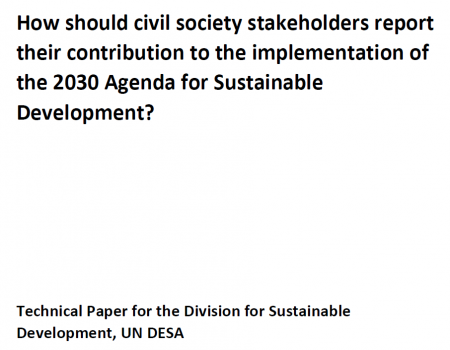How should civil society stakeholders report their contribution to the implementation of the 2030 Agenda for Sustainable Development?

Paragraph 89 of the 2030 Agenda 2030 for sustainable development calls on major groups and other stakeholders to report on their contribution to implementation of the SDGs. With specific reference to civil society organisations (CSOs), this technical paper analyses how this call should be understood, and how it should be answered. In analysing key aspects of this issue, it finds:
• A broad and inclusive understanding of the contribution of CSOs to the SDGs is needed – stressing their specific contributions to implementation via regulation (as watchdogs) and representation (as voice for people, especially those ‘left behind’), as well as realisation of sustainable development outcomes through service delivery.
• Any account of SDG reporting for CSOs must acknowledge (i) the diversity of CSOs in terms of type, size, capacity, focus etc., (ii) reporting and implementation already undertaken by CSOs and (iii) the specific “value added” by the SDGs – notably, via ideas of “leave no one behind”, universality, interconnectedness and participation.
• The key purposes of reporting - notably peer learning, coordination, and solidarity within the global partnership for sustainable development and within country, thematic, and regional contexts - should be identified and addressed in any reporting mechanisms. CSO reporting for mutual accountability is much less straightforward: the accountability demand for CSOs is distinct (and less onerous) compared to that of states.
• Not just reporting per se, but deliberation, review and follow up - and so structures and processes that facilitate these activities - are necessary to realise these collective benefits of CSO reporting for CSOs and other partners.” (p.3)
